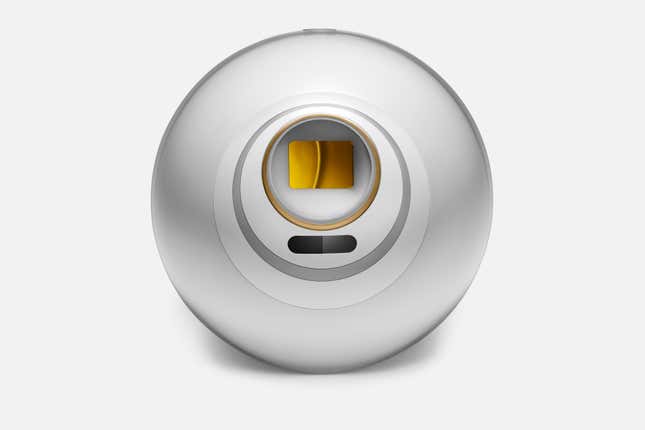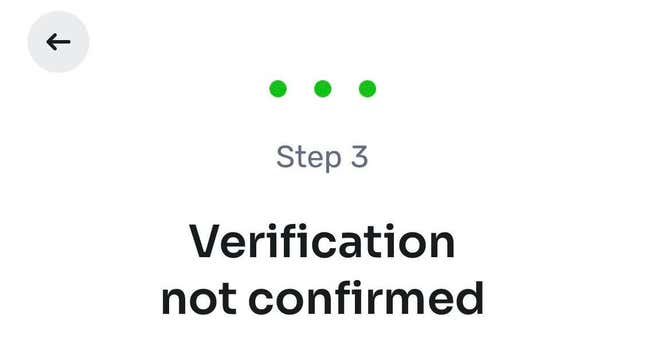OpenAI CEO Sam Altman’s buzzy startup Worldcoin has a relatively straightforward pitch to prospective users. First, you fork over a scan of your eyeball to one of several thousand iris-scanning, basketball-sized metal computers called “Orbs.” In exchange, you’ll receive a one-of-a-kind “World ID” that could one day be used to verify your identity throughout the web. In many locations, Worldcoin will actually trade you some of its own WLM cryptocurrency tokens “simply for being human,” per its website.
Gizmodo was invited for some face-to-face time with “The Orb’’ this week in New York City. The experience, which only took a few minutes, was easy, comfortable, relatively mundane, and unquestionably dystopian. We gazed into “The Orb’s” eye and saw a cynical, anarcho-capitalist dream world where displaced workers bow in servitude to Silicon Valley’s crypto philanthropists.
Gizmodo arrived at the Worldcoin pop-up, not far from Google’s office in Chelsea, dripping in sweat induced by a brutal New York heat wave. Videos circulating online showed long, winding lines of people filling city blocks eagerly awaiting their chance to sign up, so we mentally prepared ourselves for a toilsome, sweaty odyssey. Altman himself noted “crazy lines around the world” in a tweet. In reality, there was just one other person at the shared workspace signing up when we arrived.
Worldcoin staff assured us they saw a steady stream of sign-ups in New York throughout the week. The lackluster line could be attributed to the company’s decision not to offer any crypto in exchange for iris scans in the US due to an uncertain regulatory environment. Users who sign up in other markets receive 25 WLD tokens. Some two million people signed up during the beta testing period. A spokesperson told Gizmodo that could change in the future, but leadership does not appear willing to budge on that just yet. So we gave away our data for free.
“When we started thinking about this, we didn’t think it would end up as ‘world minus the US coin’ and here we are,” Altman said in an interview with the Financial Times. “The US does not make or break a project like this.”
A friendly Worldcoin representative and an “Orb operator” greeted us and helpfully answered our questions while the eye-scanning metal sphere sat lurking on the pedestal near the back of the room. To get started, the operator had us create a new account on the Worldcoin app. Our reporter was asked to verify that he was above 18 years old and was given the choice to opt-in to let Worldcoin save the image of his iris to train its future algorithms. Those who don’t opt in, the operator said, may have to revisit an Orb location to reverify their identity if Worldcoin updates its algorithms in the future. Nowhere during this process was our reporter ever asked to provide his name, phone, number, email, or other identifying information, nor had he provided that information beforehand.
Once signed up, it was time to “get Orbed” in the unofficial words of one of the representatives in the room. Our operator awakened the slumbering orb and offered it a QR code to prove he was in the room with us, presumably a safety feature to deter wannabe Orb thieves. The operator grabbed the Orb and hoisted it above our reporter’s head, urging him to gaze into a small glowing white circle. An incredibly awkward 30-second man-versus-machine staring contest ensued. In this case, humanity won. The Orb failed to verify our reporter’s identity on the first try, which we learned may have stemmed from a variety of factors, including confusion caused by his new facial hair.
Thankfully, the Orb redeemed itself on the second attempt by capturing a successful scan in around five seconds. And with that, the process was complete. In just a few minutes, our reporter, like well over two million other hapless guinea pigs around the world, handed Sam Altman his precious biometric data with the hope that one day, maybe, it could be widely used to distinguish himself from AI bots signing up for a website. He didn’t even get any crypto out of the deal.

Worldcoin wants to be an identity verifier and a universal basic income facilitator
The Orb operator and Worldcoin’s own executives describe the company effort as a multi-staged mission, with each stage akin to peeling back increasingly complicated layers of an Orb-like onion. On the most basic level, the company wants to leverage its growing database of unique iris scans to create “the world’s largest identity and financial public network.” Worldcoin believes companies will partner with it to use its World ID to separate people from the bots that plague the internet. In practice, that would look like a website offering a “Sign in with Worldcoin” option below the now standard Facebook and Google login methods. Okta, a leading identity and access management company, will be the first major company to integrate Worldcoin’s option, letting users sign in using a QR code generated on the Worldcoin app.
That might not not all that impressive on its own, but Worldcoin’s World ID is unique because, unlike verifying a login through email or social media, the World ID isn’t linked to any other identifiable info. Yes, they have all that data from iris scans, but those identifiers aren’t linked to other details directly identifying you like your name or photograph. Wordcoin believes that it makes it more impervious to data theft than other alternatives. Users can also only upload their eye scan once. Gizmodo tested this claim in the New York office by trying to have one of our reporters use his eye to sign up for another person’s World ID. The Orb omitted an unhappy beeping sound. He received an alert informing him our “verification [was] not confirmed.”

If the on-the-ground sign-up process felt relatively routine, Worldcoin’s long-term vision for the project is anything but. Aside from verifying identities online, founders Altman and Alex Blania believe their product could one day serve as the basis for universal basic income, a form of economic redistribution that’s amassed significant interest among tech leaders and libertarian circles for years.
In a nutshell, this deeper layer of Worldcoin’s strategy involves compensating users who offer their eyeballs to the company with a “share” of its cryptocurrency that could then act as a baseline income. That small share could then increase as more people around the world sign up and drive up the coin’s value. Think of it like a multi-level marketing scheme cloaked in Web3 terminology and eye-scanning robots. The WLD coin reportedly soared up to a high of $3.58 from an initial price of after its first official launch day.
Altlman believes Worldcoin can help save the world from the AI he’s creating
Altman, who’s better known for his role running OpenAI, the buzzy maker of ChatGPT, believes this vision of Orb-led redistribution could be used to prop up workers around the globe who may be displaced or made redundant by the AI systems he’s helping create. Regardless of whether or not you believe that pitch, it’s clear there real value in collecting millions of people’s unique biometric data. What Worldcoin decides to do with all of that in the future remains hard to predict. And while the company’s leaning on its coin incentive to generate interest, co-founder Blania says he would rather have Worldcoin move away from its association with crypto down the line.
“Crypto is hopefully a label that will get dropped over the coming years anyways, and it’s just essentially the technology that you use to build certain products,” Blania said during an interview with Bloomberg News.
Worldcoin is part of the boring dystopia
A Silicon Valley founder responsible for bulking up some of the worst internet villains of Web 2.0 is now spending large parts of his days jump-scaring lawmakers around the world into believing his glorified autocomplete AI chatbot may decimate labor and potentially end human existence as we know it. Now, that same founder says he can actually solve the existential problem he’s helping breathe into existence if the citizens of the world simply submit to staring into the dark abyss of a cold, lifeless iris scanning robot. And yes, of course, Worldcoin plans to make plenty of money in the process.
“All our products are for-profit,” Worldcoin Head of Product Tiago Sada said in an interview with The Financial Times.
The sad reality of “dystopian” turns of society is that it often never really feels dystopian at the time. Whether it’s driving home from work with wildfire raging a few yards away from your passenger seat or half-consciously smiling for a TSA facial recognition camera just to make it home for the holidays, the implementation and acceptance of realities once believed outside the Overton Window of possible often happens through a faint, numb trickle rather than a sudden totalitarian bang.
Trending Products

Cooler Master MasterBox Q300L Micro-ATX Tower with Magnetic Design Dust Filter, Transparent Acrylic Side Panel…

ASUS TUF Gaming GT301 ZAKU II Edition ATX mid-Tower Compact case with Tempered Glass Side Panel, Honeycomb Front Panel…

ASUS TUF Gaming GT501 Mid-Tower Computer Case for up to EATX Motherboards with USB 3.0 Front Panel Cases GT501/GRY/WITH…

be quiet! Pure Base 500DX Black, Mid Tower ATX case, ARGB, 3 pre-installed Pure Wings 2, BGW37, tempered glass window

ASUS ROG Strix Helios GX601 White Edition RGB Mid-Tower Computer Case for ATX/EATX Motherboards with tempered glass…










